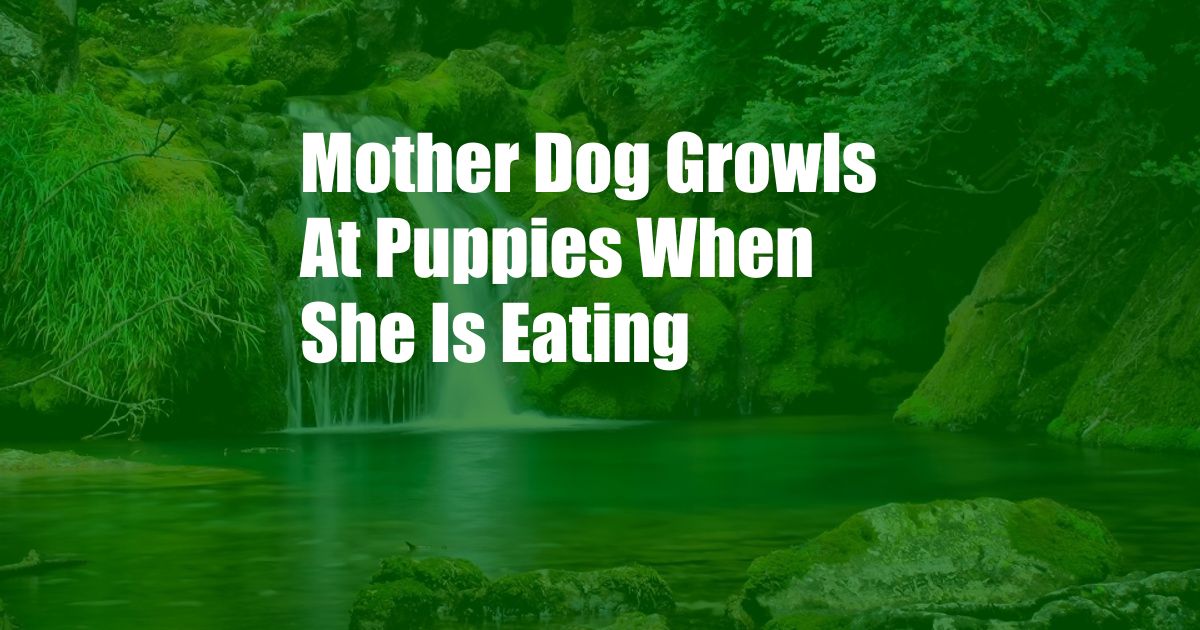
Mother Dog Growls at Puppies When She Is Eating: Understanding Canine Behavior
As a devoted dog owner, I’ve always marveled at the intricate and loving bond shared between mother dogs and their puppies. However, on occasions when our family Golden Retriever, Bella, was feeding her litter, I couldn’t help but notice a peculiar behavior: she would growl at her puppies whenever they approached her while she was eating.
Initially, I was taken aback and worried that Bella might be aggressive towards her young. But after consulting with a veterinarian and researching, I realized that this growling was a natural and typical behavior in many mother dogs. Here’s an exploration of this intriguing canine behavior and what it signifies.
Guarding Her Food: An Instinctual Response
When a mother dog growls at her puppies while eating, it’s usually a protective instinct to safeguard her food. In the wild, female canines have to fiercely defend their sustenance to ensure their own survival and that of their offspring. This instinctual behavior carries over to domesticated dogs, even though they don’t face the same level of competition for food.
Puppies are naturally curious and playful, and they may not understand that their mother needs to eat undisturbed. Her growling serves as a warning, reminding them to keep their distance and respect her boundaries.
Establishing a Hierarchy
In a canine pack, there’s a clear hierarchy. The mother dog is the leader, and the puppies are subordinate. By growling at her puppies when she’s eating, the mother dog reinforces her position and teaches them to respect her authority. This helps establish a structured and harmonious environment within the pack.
Puppies who learn to accept their mother’s dominance are less likely to challenge her authority or engage in aggressive behavior towards other littermates or adult dogs. It’s part of the socialization process that prepares them for life within a canine community.
Addressing the Behavior
While it’s normal for mother dogs to growl at their puppies when eating, it’s crucial to ensure that this behavior doesn’t escalate into aggression. Here are some tips to address the situation:
- Provide a separate feeding space: Designate a specific area where the mother dog can eat peacefully, away from her puppies’ reach.
- Feed the puppies at a different time: Avoid having the mother dog and puppies share meals simultaneously to minimize potential conflicts.
- Observe body language: Pay attention to the mother dog’s body language. A gentle growl and stiff posture indicate a warning, while a more aggressive stance or bared teeth could signify a threat.
- Train the puppies: As the puppies grow older, start training them to respect the mother dog’s food. When the puppies approach her while she’s eating, gently redirect them and reward them for staying away.
FAQs
- Is it dangerous if my mother dog growls at her puppies?
Usually, no. If a mother dog growls when her puppies approach her food, it’s a natural protective instinct. However, if the growling is accompanied by snapping or biting, it’s important to consult a veterinarian or animal behaviorist.
- What do I do if my mother dog is aggressive towards her puppies?
If a mother dog shows signs of aggression towards her puppies, separating them is important. Keep the mother dog and puppies in separate areas and consult a veterinarian or animal behaviorist immediately to determine the cause of the aggression.
- Will the growling behavior continue once the puppies mature?
The growling usually decreases as the puppies wean and become less reliant on their mother for food. However, some mother dogs may continue to guard their food from their offspring, even as adults.
Conclusion
Understanding the natural behavior of mother dogs is essential for harmonious human-canine relationships. When a mother dog growls at her puppies while eating, it’s usually not a sign of aggression but rather an instinctual protective measure. By providing a separate feeding space, training the puppies, and observing body language, you can address any concerns and ensure a healthy and fulfilling relationship between the mother dog and her litter.
Is understanding mother dog behavior important to you? Share your thoughts and experiences in the comments below!